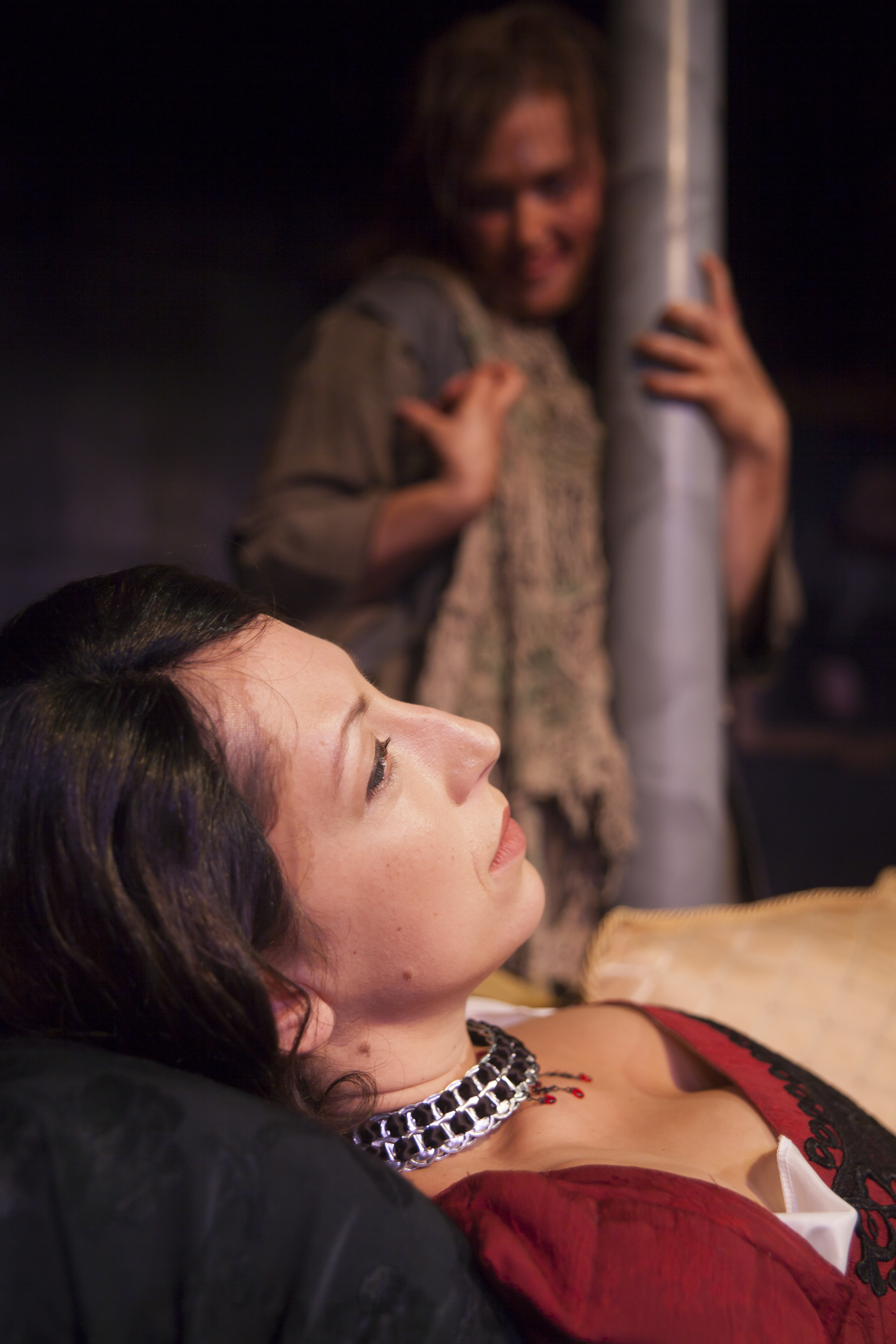PBlood Countess
Annex Theatre, 1110 Pike St., 728-0933, annextheatre.org. $5–$20. 8 p.m. Thurs.–Sat. plus Mon., Nov. 10. Ends Nov. 22.
Feeling anemic? Luckily it’s easy to take iron-supplement pills these days. Back at the turn of the 16th century, one had to be more creative for a cure—like drinking virgins’ blood, which Hungarian countess Elizabeth Bathory allegedly did by quaffing from 600 young women. In Kelleen Conway Blanchard’s stage version of Bathory’s life, the countess first starts killing as a means to sexual arousal, then later to stay young and beautiful, like a Dorian Gray vampire.
Though it suffers from the episodic nature of many history-based bio plays, Blood Countess is a lot of fun. As the countess, Terri Weagant’s unconventional looks and excellent expressive range are riveting—until you realize that she’s just not that scary. Director Bret Fetzer has her focus more on the black comedy than on freezing your blood. Indeed, two other characters in her entourage are far more freaky: a deranged, id-like provocateur named Fitzco, played with nearly boundless perversity by Erin Stewart; and a priest, played with chilling, sexualized placidity (and heavy eye makeup) by Martyn G. Krouse. Bathory’s violence-loving libertine husband Ferenc (James Weidman) is another unctuous delight. In Bathory’s grim castle (a simple, black-walled, portrait-adorned set by Susannah Anderson), victims progress from birds to a parade of neighborhood girls (all winningly portrayed by Sarah Windsor).
This entertaining Halloween show is studded with graphically vulgar details (like boar-blood enemas and dismal congenital diseases), but there’s a trifle too much of it. At 140 minutes including intermission, the play has a good half-hour of adipose that could’ve profitably been trimmed and fed to Fitzco. No one cares much when the countess meets her inevitable demise; in today’s context, the vain, youth-craving Bathory could more responsibly serve her obsessions at Sephora and the plastic surgeon’s office. But canny performances and a wacky, Wikipedia-confirmed bite of Hungarian history make the Bathory vein a worthwhile draught. margaret Friedman
Twelfth Night
Center House Theatre (Seattle Center), 733-8222. $30–$39. See seattleshakespeare.org for schedule. Ends Nov. 16.
The prewar surrealists fused dream and reality via startling, illogical juxtapositions, tinged with notions of Freud and the fractured self. It’s not a bad choice of milieu for Twelfth Night, where twins Viola and Sebastian are separated by shipwreck and pine for reunion like cleaved halves of one being. In theory, this is an inspired setting for Shakespeare’s durable comedy, full of cross-dressing and mistaken identity, yet my watch ran slower than one of Dali’s dripping timepieces.
As Viola, 16-year-old Allie Pratt is a short, chicly shorn, comfortably androgynous powerhouse when masquerading as Cesario. These qualities abet her resemblance to Sebastian, but undercut Viola’s core femininity and internal conflict. Likely at the behest of director Jon Kretzu, the scenes with her romantic quarry/employer Duke Orsino (Jay Myers) yield no sexuality whatsoever, homo or hetero, which neuters their final union.
Given the surreal setting, plausibility is not Kretzu’s goal. The clowning of Sir Toby Belch (Mike Dooly) and his buddies—George Mount’s Sir Andrew is particularly good—relies on swami garb and prop gags, but gets stale rather quickly. Musical interludes by the fool (Conner Neddersen) are downright dismal blues numbers nearly as excruciating as the eyeball-cutting scene in Bunuel’s Un Chien Andalou. Andrea Bryn Bush’s Magritte-like set features floating umbrellas and a backdrop of ruched mens’ business shirts. Like the rest of the production, it’s cleverly conceived but emotionally unsettling.
However, a few exceptional moments work little wonders—most notably at the outset, when Viola rifles through a chest of linens, clearly symbolizing her psyche, and finds a full-clothed man inside, whom she stuffs back down into it. Later, she and Orsino are interrupted by a ghostly Sebastian (Christopher Morson), somnambulating downstage in drag and parasol, representing her other half both in genes and in gender.
Olivia (Elinor Gunn), the noblewoman who falls for her manservant Cesario, is portrayed as a glamorous but screechy hysteric. Her neurotic outbursts do signal some of the repressed passions that link surrealism and Kretzu’s interpretation of the text. They do not, however, make the attenuated three-hour run time any more liquid. margaret Friedman
E
stage@seattleweekly.com




